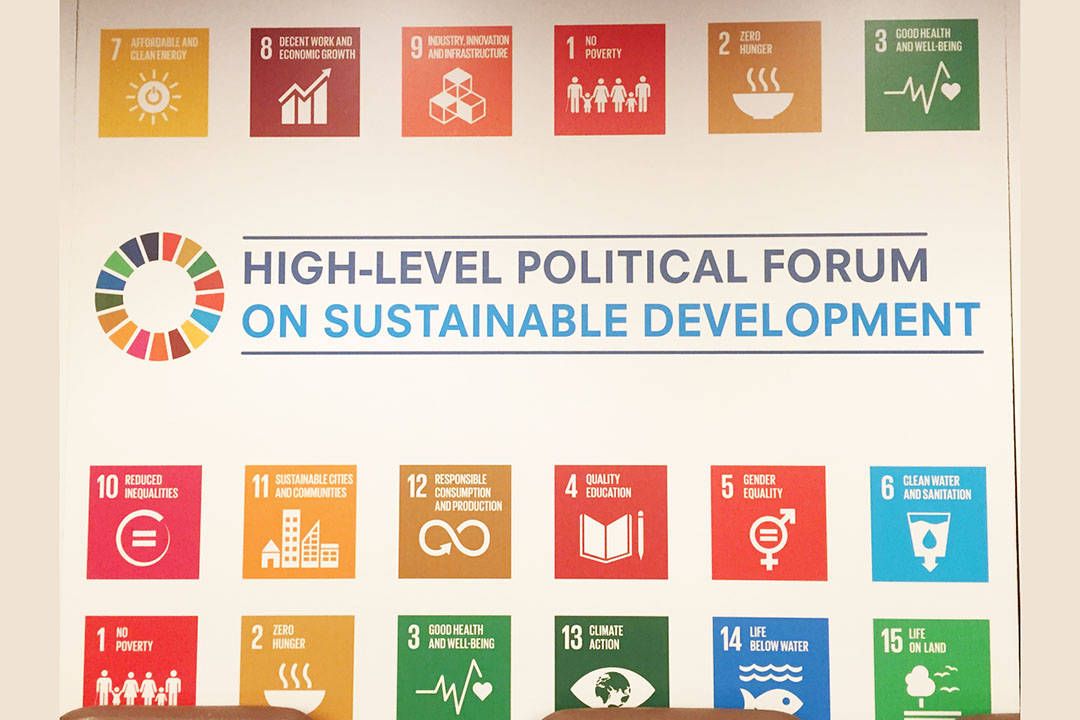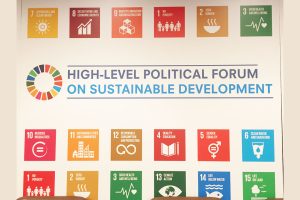SDG 17, on the means of implementation for the 2030 Agenda and partnership for sustainable development, will be the subject of an expert meeting recently announced as preparation for the 2018 session of the UN High-level Political Forum on Sustainable Development (HLPF). Many other activities are underway as well, including additional expert group meetings and the preparation of 47 voluntary national reviews of SDG implementation.
The HLPF – the UN body with the “central role in overseeing a network of follow-up and review processes at the global level,” according to the 2030 Agenda – will convene in two segments between 9-18 July 2018, as described below. In addition to the official meetings, governments, stakeholders and UN representatives will gather on the sidelines for several “special days” and dozens of side events.
First Week: SDG Review, Views from Regions and Others, and Partnership Exchange
The UN Secretary-General will kick off the first week of HLPF 2018 with a presentation of the UN’s annual progress report on all 17 SDGs. The rest of the week (9-13 July) will feature the in-depth review of six SDGs: Goals 6 (clean water and sanitation), 7 (affordable and clean energy), 11 (sustainable cities and communities), 12 (responsible consumption and production), 15 (life on land) and 17 (partnership for the Goals). Each Goal has a two-hour slot on the programme.
The UN Department of Economic and Social Affairs (DESA) has organized expert group meetings on many of the Goals under review. The series began with an EGM on interlinkages among all SDGs, which convened in New York, US, from 25-26 January 2018. This meeting was followed by meetings on:
- SDG 7, with a ‘global SDG 7 conference’ held in Bangkok, Thailand, from 21-23 February, which is summarized here;
- SDG 11, with a side event at the 9th World Urban Forum in Kuala Lumpur, Malaysia, on 11 February, which is summarized here; and
- SDG 12, with an expert group meeting held in New York, from 3-4 May 2018. Our story on this meeting is here.
On SDG 6, UN-Water has led a process to develop a synthesis report to help establish the baseline for SDG 6 implementation – the first such report for an SDG. A draft of the SDG 6 Synthesis Report has been released for public comment.
An EGM on SDG 15 will take place from 14-15 May 2018, in New York, to develop messages on improving SDG 15 implementation, including: success stories, good practices and challenges; areas of concern; and suggested ways forward in terms of policies, partnerships and coordinated actions at all levels.
An EGM on SDG 17 has been announced for 12 June, also in New York. This event will focus on innovative multi-stakeholder approaches, and partnerships that advance the SDGs through the other means of implementation.
Governments also have met at the regional level to exchange views on progress towards the 2030 Agenda. The series of regional fora on sustainable development (RFSDs) hosted by the UN regional economic commissions took place between March and May 2018, with meetings in Geneva, Switzerland (UNECE); Bangkok, Thailand (ESCAP); Santiago, Chile (ECLAC); Beirut, Lebanon (ESCWA); and Dakar, Senegal (UNECA).
Also during the first week, in addition to reviewing the sub-set of SDGs, delegates at the HLPF will address: lessons from the regions; synergies and trade-offs; science, technology and innovation for the SDGs; the science-policy interface and emerging issues; and the perspectives of stakeholders, small island developing States (SIDS), and LDCs, LLDCs and MICs.
On the final afternoon of the first week, participants will consider whether the 2030 Agenda is succeeding in its ambition to leave no one behind. On the sidelines of the official sessions, participants will gather for a Higher Education Sustainability Initiative (HESI) event on 11 July, and a Partnership Exchange on 13 July.
Second Week: Ministerial Segment, VNRs, Local Governments and Business Days
The second week of HLPF 2018 (16-18 July) will be convened as a ministerial meeting and held jointly with the annual High-level Segment of the UN Economic and Social Council (ECOSOC). The outcome will be a joint ministerial declaration from both the HLPF and ECOSOC, which will be negotiated by UN Member States through informal consultations before the HLPF.
The programme for the second (ministerial) week features the presentation of voluntary national reviews (VNRs), in which 47 governments will report on their efforts to implement the SDGs. The 47 Member States are: Benin, Cabo Verde, Egypt, Guinea, Mali, Namibia, Niger, Republic of the Congo, Senegal, Sudan. Togo, Bahrain, Bhutan, Kiribati, Lao People’s Democratic Republic, Lebanon, Saudi Arabia, the State of Palestine, Qatar, Singapore, Sri Lanka, United Arab Emirates, Viet Nam, Albania, Armenia, Hungary, Latvia, Lithuania, Poland, Romania, Slovakia, Bahamas, Colombia, Dominican Republic, Ecuador, Jamaica, Mexico, Paraguay, Uruguay, Andorra, Australia, Canada, Greece, Ireland, Malta, Spain, and Switzerland.
Seven governments will present their second VNR during HLPF 2018. Benin, Qatar and Uruguay presented in 2017, and Colombia, Egypt, Mexico and Switzerland presented in 2016. Togo will present for the third time, having already done so in both 2016 and 2017.
DESA has released a handbook to guide the governments in preparing and presenting their VNRs, along with a Questions and Answers document. The ‘Handbook for the Preparation of Voluntary National Reviews,’ issued in January 2018, serves as a supplement to VNR guidelines provided by the UN Secretary-General. It is “designed to provide elementary building blocks for a country in the preparation of its reviews.” Our summary of the handbook is here. The Q&A addresses the scope of the review and report, potential sources of information and support, level of participation, and follow-up to the VNRs, among other topics.
The 47 governments are requested to release the main messages of their VNRs by 18 May.
The 47 governments are requested to release the main messages of their VNRs by 18 May, and their final reports by 18 June 2018. In 2017, the VNR main messages highlighted the adoption of institutional arrangements, as well as measures related to monitoring, financing, accountability, integration in planning and legislative documents, localization and inclusion, according to our summary of the documents.
Rounding out the special days on the margins of the ministerial meetings, a Local and Regional Governments’ Forum is scheduled to take place on 16 July, followed by the third SDG Business Forum on 17 July. Other side events are being organized by dozens of stakeholders. Registration for NGOs to attend the HLPF was opened on 8 May, with a deadline of 15 June.
Continue watching this space for reporting on the next phase of activity ahead of this year’s Forum, and many of its highlights and surrounding events.

